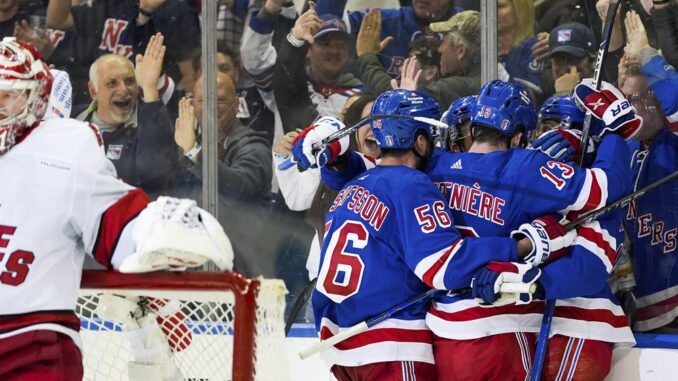
NEW YORK — If the Carolina Hurricanes are going to win their second round series against the New York Rangers, their special teams need to show up.
They didn’t in Game 1.
The Rangers scored three first period goals, including a pair on their only two power play opportunities, and the Hurricanes’ power play went 0 for 5 as New York won the series opener 4-3 Sunday at Madison Square Garden.
“You win that battle,” Hurricanes captain Jordan Staal said of special teams, “you have a really good chance of winning, and we didn’t tonight.”
New York center Mika Zibanejad had a pair of first period goals, sandwiching one from Carolina defenseman Jaccob Slavin — all in the first 10:05 of the opening period — and former Hurricanes center Vincent Trocheck’s power play goal had Carolina chasing a 3-1 deficit after just over 16 minutes of the opening period.
“A lot of things happened there,” Hurricanes center Sebastian Aho said.
The Hurricanes did make a push, pulling within one goal twice in the third period only to see their comeback effort fall short.
Carolina first clawed back off a perfect zone entry.
Hurricanes defenseman Dmitry Orlov made a short saucer pass to Jordan Martinook, who caught Martin Necas in stride cutting through the middle of the ice. Necas scored under Rangers goalie Igor Shesterkin (22 saves) to make it 3-2 at 2:48 of the third period.
New York, however, responded just over five minutes later when Artemi Panarin opted to shoot on a 2-on-1, leaking the puck through Carolina goalie Frederik Andersen (19 saves) at 8:21 to reestablish the Rangers’ two-goal lead.
“It bounces over our stick and, unfortunately, the wrong player for us and a great player for them,” Hurricanes coach Rod Brind’Amour said.
Then with Andersen on the bench for an extra attacker, Seth Jarvis scored his fourth goal of the postseason by finding the puck in a scramble and putting it in with 1:45 remaining.
Carolina again pulled Andersen and drew a puck over the glass penalty on Trocheck, but Andrei Svechnikov was called for a trip on the ensuing faceoff and the Hurricanes didn’t threaten again for the equalizer.
“We did a lot of good things in that game, especially at the end,” Aho said, “We got good pressure on them and obviously got one goal back, and the second one wasn’t too far either. So (we’ve) just got to build on that.”
Zibanejad’s power play goal that gave New York the lead for good was preceded by controversy.
Just before the midway point of the first period, Necas took out the legs of Rangers forward Will Cuylle along the boards in the neutral zone a split second before Tony DeAngelo hit Cuylle with a body check. A referee raised his arm for the Necas trip and sent him to the box, but the officials then announced that a major penalty had been called and was under review.
The officials negated the major but then pulled Necas from the box and gave a roughing minor to DeAngelo.
According to Rule 20.6 of the NHL Rulebook, officials are not permitted to change a penalty recipient based on replay.
“The Referee shall have the following options after video review of his own call: (i) confirming his original Major Penalty call; (ii) reducing his original Major Penalty call to a lesser penalty; or (iii) rescinding the original Major Penalty altogether,” the rulebook states.
Yeah, this appears to be a communication breakdown more than break in protocol
Wish they'd announce the original call on the ice in all cases before going to review.
Can't change the penalized player via review
— Scouting The Refs (@ScoutingTheRefs) May 5, 2024
Brind’Amour, asked if he received an adequate explanation from the officials, responded, “Na. Not one that made sense to me.”
That led to the Rangers breaking the early 1-1 tie when Zibanejad scored his second goal of the period. The second power play goal, by Trocheck, extended New York’s lead to 3-1 with just under four minutes left in the opening period.
“A couple kills we didn’t quite execute right and they did. … We were just a step off,” Brind’Amour said, “and that’s the difference.”
On top of their struggles on the penalty kill, Carolina failed to convert on its power play.
The Hurricanes had just four shots on six power play opportunities, leaving Shesterkin mostly unchallenged.
“We had five PPs too, so they called it both ways,” DeAngelo said, not allowing the penalty on him to be an excuse for the loss. “It’s a tough job for them guys and they make the calls. So it is what it is.”
Now the Hurricanes will look to avoid a 2-0 hole as they prepare for Game 2 on Tuesday in New York. Carolina believes it can build on Game 1 despite the loss.
“I thought we played a pretty good game,” DeAngelo said. “They’ve got a good team, but we know what we’ve got here — we’ve got six more games.”
Notes: Jake Guentzel finished with game highs in shots on goal (five) and shot attempts (nine), picking up an assist on Slavin’s goal, but he still has just three 5-on-5 goals in 23 games since joining Carolina. His most recent was on April 9 in Boston. … Guentzel was credited with four blocked shots. … Zibanejad finished with three points, all coming in the first period. … After allowing teams to go perfect on the power play just once during the regular season (Detroit, 1 for 1 on Jan. 19), the Hurricanes have allowed it to happen twice in the postseason. The Islanders went 1 for 1 in Game 2, and the Rangers were 2 for 2 in Sunday’s Game 1.
